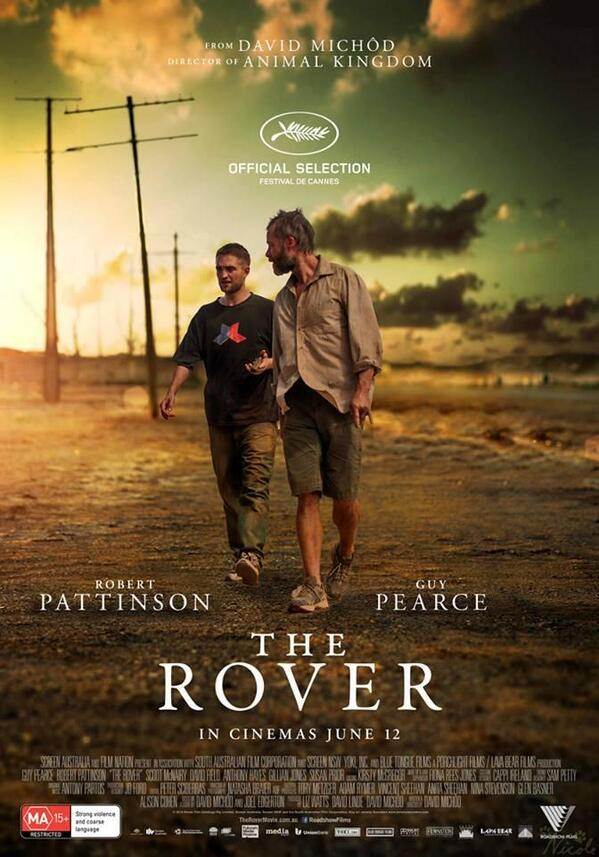I feel betrayed by the Outback Steakhouse. The Rover takes Mad Max and mixes him with a little feeling of modern times. We are quickly transported (after the fall, as the voiceover says) to a bleak, desolate place personified by the people living there. I guess 9.99 is a little low for a happy hour special here.
The story drops in on a man (Guy Pearce, who doesn’t reveal his name) enjoying a drink at a stop along the highway. As he libates in peace, 3 men (Scoot McNairy, Tawanda Manyimo, and David Field) steal his car. This lights a fire under this man, who searches for the thieves. Falling in his lap is Rey (Robert Pattinson), the low-functioning brother of one of the thieves. The car chaser then captures Rey and takes him hostage so he can get his prized possession back.
The Australian Outback feels a lot like the Wild West in the United States. Due to societal collapse, the world has fragmented itself: you either can drift between locations or set up shop with your supplies. Mistrust abounds: each person to person meeting involves a firearm or barricade. Loneliness is expected unless you find a posse. These are all common tropes of a Western. The Rover spices things up using its modernity (like Mad Max did), but doesn’t go far enough with its premise. What would it be like of Facebook/Twitter just left the planet? How do you pay for things? How would the military get involved? These questions the Rover avoids in favor of showcasing bleakness in the Outback.
Vast emptiness and loneliness eventually gives way to stasis. The key for any motion picture is to make sure each deliberate movement with a mozying tone infuses each scene with tension and dread to keep the narrative from stalling. The Rover is hit and miss with generating tension, with more examples of the former than the latter. The movie uses two basic tactics to keep the energy level elevated: slow burning silence and boo! moments. With unending stillness, watching a car approach can be very scary, or a simple knock on the door holds “horror” behind it. Paranoia can easily build in survivors of terrible events, and The Rover succeeds at making the audience feel the way the characters feel.
Guy Pearce, working with a full on scraggle beard, does a lot with a little as our main man. Pearce is great at showing intensity, irrationality, and irritability within the same scene, necessary to keep the story moving forward. The big gamble is Robert Pattinson: asking a sullen teen heartthrob vampire to play a dimwitted loyal lackey seems like a producer critique. What was my biggest red flag for The Rover turned into its greatest asset. Pattinson is brilliant here, never falling into Simple Jack territory, and easily allowing the audience to connect with Rey.
The Rover (David Michod’s second feature) gives us a real world post apocalypse. It is not fun; there are no wenches or sarsaparilla. There is only finding direction and goals and surviving. Michod made one big mistake though: in the event of a collapse, there is no way the US dollar would be the primary currency; pretty sure the British pound is a safer bet.

